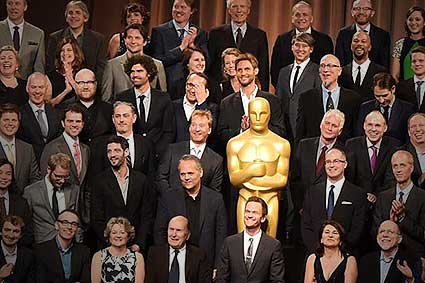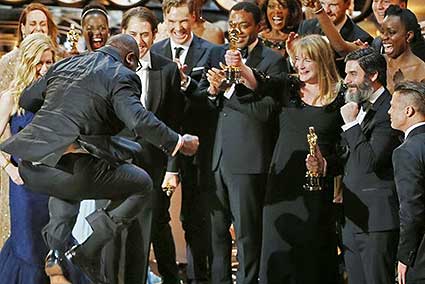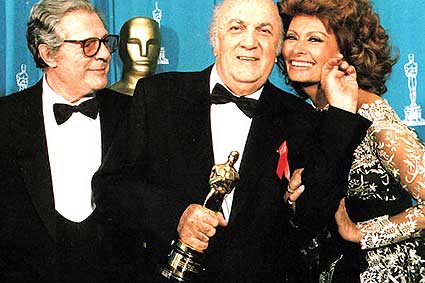Oscars: Fade To Black
Gli Americani sono ancora interessati agli Oscar? L’opinione di Stephen L. Bainton* - Traduzione di Rita Imperiali
 The Oscars were once a very glamourous and prestigious event, both for American and foreign producers, directors actors, and their worldwide fans. Today, the entire Hollywood landscape has changed…and this change is permanent.
The Oscars were once a very glamourous and prestigious event, both for American and foreign producers, directors actors, and their worldwide fans. Today, the entire Hollywood landscape has changed…and this change is permanent.
Now, with its dwindling viewership—due to the multitude of entertainment options—the Oscars has lost much of its prestige, becoming in many ways a narcissistic event, an event for industry insiders who wish to pat themselves on the back, while viewing fans focus on what their favorite stars are wearing. Most of the ‘Red Carpet’ shows preceding the actual event focus on dress, jewelry, and shoe designers, along with poisoned gossip concerning those stars that have sadly transformed their faces into something quite unrecognizable.
It is sad to see a once serious event become another opportunity for product promotion and freak show parades.
 Serious European filmmakers, however, must focus less on the events of one night, and understand the megatrends now transforming the movie business. Here are three trends you should seriously consider:
Serious European filmmakers, however, must focus less on the events of one night, and understand the megatrends now transforming the movie business. Here are three trends you should seriously consider:
With the Internet and digital technologies, entertainment options have exploded.
Filmmaking is going digital, big time.
More than ever, filmmaking is now an international proposition.
First, the Internet has opened up new methods of distribution for filmmakers. This is both good and bad. It means that a great filmmaker can now get his or her work seen by a worldwide audience; it also means that an idiot with a camera now views himself as the next Hitchcock or Fellini…though I doubt he or she knows either. In addition, many worldwide viewers now lack any patience for a film to unfold. Many would prefer to just watch cat or dog videos on YouTube. With so many available entertainment options, the battle for the viewer is becoming more intense.
 Second, the future of cinema is digital; 35mm film and the ‘good old days’ is rapidly coming to an end. Most of the major exhibitors in the United States are switching over to digital projectors and theaters. It saves them the cost of making and transporting film; in fact, a film file can be quickly downloaded to any theater nationwide. The positive news here is that digital cameras and editing equipment are very inexpensive, thereby allowing filmmakers on a tight budget to compete with the big producers (if they have a great script and now the tricks of putting the money on the screen).
Second, the future of cinema is digital; 35mm film and the ‘good old days’ is rapidly coming to an end. Most of the major exhibitors in the United States are switching over to digital projectors and theaters. It saves them the cost of making and transporting film; in fact, a film file can be quickly downloaded to any theater nationwide. The positive news here is that digital cameras and editing equipment are very inexpensive, thereby allowing filmmakers on a tight budget to compete with the big producers (if they have a great script and now the tricks of putting the money on the screen).
Third, European filmmakers must understand the global nature of this business. For instance, if shooting in Italy, you would shoot it digitally and use actors who can speak both Italian and English. In this way, you have just broadened your worldwide audience potential, a smart business and marketing move. Given the inexpensive costs of digital filmmaking, there is no excuse not to do this; besides, the lighting for the shot would remain the same.
 In short, subtitles limit your film’s release in theatres, period.
In short, subtitles limit your film’s release in theatres, period.
With this international mindset, a filmmaker must be both a talented creator and a savvy business person. And that includes knowing how to read a contract, with an understanding that distributors will always try to take advantage of producers who don’t know how to properly profit from their various intellectual property rights, from sequels to books to even toys based on their film. George Lucas recently commented that he made a fortune from the sale of ‘Star Wars’ toys and action figures.
In short, Americans are becoming less interested in the Oscars, and this trend will continue as more entertainment options pop up. For the serious creator, however, this is not important. What matters is great work—work that resonates in the human heart, something that Italian directors understand.
*Stephen L. Bainton studied at the University of San Diego and Columbia University Graduate Film School (under Milos Forman). He is starting an Internet media company. He lived in Rome and Cagliari, and loves the great European directors, including Fellini, Sternberg, Eisenstein, along with Hitchcock, and Tarantino. His favorite films are: ‘Chariots of Fire,’ ‘Gladiator,’ and ‘400 Blows.’
Il tramonto dell’Oscar. Articolo di *Stephen L. Bainton. Traduzione di Rita Imperiali Bainton
 Gli Oscar una volta erano un evento glamour e di prestigio, sia per i produttori Americani e stranieri, registi attori e i loro fan in tutto il mondo. Oggi, l'intero panorama di Hollywood è cambiato e questo cambiamento è permanente. Al giorno d’oggi con il calo di interesse da parte del pubblico a causa della moltitudine di opzioni di intrattenimento, l'Oscar ha perso molto del suo prestigio, diventando un evento narcisistico, un evento per gli addetti del settore, mentre i fan si concentrano più su ciò che le loro star preferite indossano. La maggior parte degli spettacoli del 'Red Carpet', che precedono l'evento reale, danno piu' importanza ai vestiti, gioielli e fashion designers di scarpe, con i vari pettegolezzi riguardanti le stelle alcune delle quali che hanno purtroppo trasformato le loro facce in qualcosa di irriconoscibile. E' triste vedere un evento, una volta cosi’ importante, diventare un'altra opportunità per promozione di prodotti e sfilate di mostri.
Gli Oscar una volta erano un evento glamour e di prestigio, sia per i produttori Americani e stranieri, registi attori e i loro fan in tutto il mondo. Oggi, l'intero panorama di Hollywood è cambiato e questo cambiamento è permanente. Al giorno d’oggi con il calo di interesse da parte del pubblico a causa della moltitudine di opzioni di intrattenimento, l'Oscar ha perso molto del suo prestigio, diventando un evento narcisistico, un evento per gli addetti del settore, mentre i fan si concentrano più su ciò che le loro star preferite indossano. La maggior parte degli spettacoli del 'Red Carpet', che precedono l'evento reale, danno piu' importanza ai vestiti, gioielli e fashion designers di scarpe, con i vari pettegolezzi riguardanti le stelle alcune delle quali che hanno purtroppo trasformato le loro facce in qualcosa di irriconoscibile. E' triste vedere un evento, una volta cosi’ importante, diventare un'altra opportunità per promozione di prodotti e sfilate di mostri.
 Registi europei seri, devono tuttavia concentrarsi meno sugli eventi di una notte e capire le tendenze fondamentali che hanno trasformato il mondo del cinema.
Registi europei seri, devono tuttavia concentrarsi meno sugli eventi di una notte e capire le tendenze fondamentali che hanno trasformato il mondo del cinema.
Tre sono le tendenze da considerare seriamente:
1. L'esplosione di opzioni di intrattenimento con le tecnologie digitali e su Internet.
2. Oggi il Filmmaking e quasi interamente in forma digitale.
3. Il cinema è ora più che mai una proposta Internazionale.
In primo luogo, l’Internet ha aperto nuove modalità di distribuzione per i registi. Questo è sia un bene ed un male. Ciò significa che un grande regista può ora ottenere che la sua opera sia vista da un pubblico globale; ma significa anche che qualsiasi idiota con una fotocamera si veda come il prossimo Hitchcock o Fellini ... anche se dubito che la maggior parte sappia neanche chi siano. Inoltre, molti spettatori in tutto il mondo non hanno molta pazienza per lo svolgimento della storia in un film. Molti preferirebbero vedere video di due minuti di cuccioli e gattini su YouTube. Con così tante opzioni di intrattenimento disponibili, la battaglia per lo spettatore è sempre più intensa.
 In secondo luogo, il futuro del cinema è digitale; il metodo di usare la pellicola da 35 mm dei 'bei vecchi tempi' sta rapidamente volgendo al termine. La maggior parte dei principali espositori negli Stati Uniti stanno passando direttamente ai proiettori digitali per i cinema. Risparmiano il costo del trasporto di film; infatti, un film digitale può essere rapidamente scaricato in qualsiasi teatro nazionale in un istante. La buona notizia è che le fotocamere digitali e le apparecchiature di editing sono molto economiche, consentendo in tal modo ai registi con un budget limitato di competere con i grandi produttori (se hanno come base un’ottima sceneggiatura e conoscono i trucchi di investire il denaro verso la cosa piu' importante dello schermo: le immagini).
In secondo luogo, il futuro del cinema è digitale; il metodo di usare la pellicola da 35 mm dei 'bei vecchi tempi' sta rapidamente volgendo al termine. La maggior parte dei principali espositori negli Stati Uniti stanno passando direttamente ai proiettori digitali per i cinema. Risparmiano il costo del trasporto di film; infatti, un film digitale può essere rapidamente scaricato in qualsiasi teatro nazionale in un istante. La buona notizia è che le fotocamere digitali e le apparecchiature di editing sono molto economiche, consentendo in tal modo ai registi con un budget limitato di competere con i grandi produttori (se hanno come base un’ottima sceneggiatura e conoscono i trucchi di investire il denaro verso la cosa piu' importante dello schermo: le immagini).
Terzo, i registi europei devono capire la natura globale di questo business. Un consiglio per i direttori di film in Italia, dovrebbero riprendere digitalmente e utilizzare attori che possono parlare italiano e inglese. In questo modo, si amplia il potenziale di catturare il pubblico mondiale, una mossa intelligente per business e marketing. Dati i costi economici di cinema digitale, non ci sono scuse per non farlo; inoltre la ripresa rimarrebbe la stessa. In breve, i sottotitoli limitano il rilascio del film nelle sale. Con questa mentalità internazionale, un regista deve essere sia un creatore di talento e un uomo d'affari molto astuto.
 Questo significa saper leggere un contratto; capire che i distributori di film approfittano sempre dei produttori ignari che non sanno come trarre profitto dai loro diritti di proprietà intellettuale: dal sequel, ai libri e giocattoli basati sulla loro pellicola. George Lucas ha recentemente commentato che ha fatto una fortuna con la vendita di giocattoli da 'Star Wars' con la vendita di action figures.
Questo significa saper leggere un contratto; capire che i distributori di film approfittano sempre dei produttori ignari che non sanno come trarre profitto dai loro diritti di proprietà intellettuale: dal sequel, ai libri e giocattoli basati sulla loro pellicola. George Lucas ha recentemente commentato che ha fatto una fortuna con la vendita di giocattoli da 'Star Wars' con la vendita di action figures.
Concludendo gli Americani sono sempre meno interessati agli Oscar, e questa tendenza continuerà con tante opzioni di intrattenimento che diventano disponibili. Per il creatore serio di cinema, tuttavia, questo non è importante. Ciò che conta è il lavoro serio, l'opera che risuona nel cuore umano, quel qualcosa che i bravi registi italiani capiscono.
*Stephen L. Bainton Boca Raton, Florida U.S.A. ha studiato all'Università di San Diego California e Columbia University Graduate Film School, New York (sotto Milos Forman). Lavora negli USA in una società di media su Internet. Ha vissuto a Roma e Cagliari, e ama i grandi registi europei, tra cui Fellini, Sternberg, Eisenstein, insieme a Hitchcock, e Tarantino. Film preferiti: "Chariots of Fire, '' Il Gladiatore", "I 400 Colpi ", "Grand Illusion", "Cinema Paradiso" e "8 1/2".
© Stephen L. Bainton 2015 Article may be reproduced and shared if proper credit given to the author.
18 febbraio 2015
